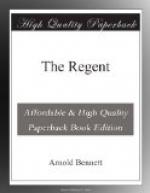It was a remarkable fact that, while giving undemanded information to Dr. Stirling, Edward Henry was in reality defending himself against the accusations of his wife—accusations which, by the way, she had never uttered, but which he thought he read sometimes in her face. He might of course have told his wife these agreeable details directly, and in private. But he was a husband, and, like many husbands, apt to be indirect.
Nellie said not a word.
“Then you’re giving up London?” The doctor rose to depart.
“I am,” said Edward Henry, almost blushing.
“Why?”
“Well,” the genius answered. “Those theatrical things are altogether too exciting and risky! And they’re such queer people—Great Scott! I’ve come out on the right side, as it happens, but—well, I’m not as young as I was. I’ve done with London. The Five Towns are good enough for me.”
Nellie, unable to restrain a note of triumph, indiscreetly remarked, with just the air of superior sagacity that in a wife drives husbands to fury and to foolishness:
“I should think so indeed!”
Edward Henry leaped from his chair, and the swansdown quilt swathed his slippered feet.
“Nell,” he exploded, clenching his hand. “If you say that once more in that tone—once more, mind!—I’ll go and take a flat in London to-morrow!”
The doctor crackled with laughter. Nellie smiled. Even Robert, who had completely ignored the doctor’s entrance, glanced round with creased brows.
“Sit down, dearest,” Nellie quietly enjoined the invalid.
But he would not sit down, and, to show his independence, he helped his wife to escort Stirling into the lobby.
Robert, now alone with the ignored young clerk tapping at the table, turned towards him, and in his deliberate, judicial, disdainful, childish voice said to him:
“Isn’t father a funny man?”



